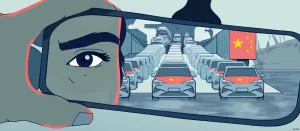The meeting between China‘s minister of commerce, Wang Wentao, and EU Trade Commissioner Valdis Dombrovskis in Brussels last week (September 19) came after the EU announced plans in July to levy import duties of up to 36% on some Chinese electric-vehicle (EV) imports, on top of the EU’s standard 10% import duty on cars.
Following an anti-subsidy investigation started by Brussels last year, the EU Commission said China’s vast state subsidies create an unfair advantage for Chinese automakers and violate the principle of a level playing field for all competitors in the EV market.
Beijing has rejected the findings of the EU probe. After speaking to businesses on the sidelines of his EU visit, Wang said last week China “will certainly persevere until the final moments of the consultations,” as quoted in a statement by the Chinese Chamber of Commerce to the EU.
Dombrovskis posted on X that both sides agreed to “find an effective, enforceable and WTO compatible solution” to the conflict.
The spokesman for EU trade, Olof Gill, told DW that “the technical teams will now engage in an intensive way to discuss the issues.”
EU-China compromise in the making?
Several news outlets have reported that the EU may be willing to trim its tariff plans for Chinese and other EV imports to the bloc.
Quoting a source familiar with the talks, news agency Reuters reported that Tesla’s proposed tariff rate could drop to 7.8% from 9%. Chinese companies like BYD would see no change to its 17% tariff, while Geely’s rate is said to fall to 18.8% from 19.3%. A peak rate of 35.3% would apply to SAIC Motor and other companies not cooperating with the EU investigation, the source told Reuters.
However, the duties are still too high in the opinion of Wang Wentao. He left Brussels, however, with a promise from the EU that if he came back with a better offer on prices or volumes, there would be another meeting. “The two sides agreed to take a renewed look at price undertakings,” Dombrovskis said.
Before meeting EU officials, the Chinese commerce minister visited Berlin and Rome in an apparent move to sway government opinion in the two carmaking countries.
China threatens tit-for-tat retaliation
Ever since the EU started its investigation into Chinese carmakers’ pricing policies, Beijing has threatened to retaliate against the higher EU tariffs. The Communist government has vowed to impose higher duties on several EU products and warned of major consequences for bilateral trade.
Noah Barkin, a senior advisor with the Rhodium Group, believes Beijing will “redouble its efforts” to swing a vote among member states in the EU Council that was originally scheduled for September 25 but has already been postponed. “This will involve threats of retaliation as well as promises of more Chinese investment directed at individual member states,” he told DW.
Meanwhile, the Chinese government has opened anti-subsidy investigations into imports of European pork, brandy and dairy products in a move seen as punishing especially France for its strong pro-tariff stance. The Chinese dairy industry has also requested the government to look into European exports of cheese, cream and milk. China contends that EU subsidies give European farmers an unfair advantage in the Chinese market, hurting the domestic dairy industry.
According to the EU statistics office, Eurostat, China is the eighth-largest market for EU dairy exports with a trade volume of €1.7 billion ($1.89 billion) last year. Italy, the Netherlands, Denmark and France are the biggest EU dairy exporters to China.

Despite China’s tit-for-tat tariff policy, Italian Foreign Minister Antonio Tajani said his government “supports the EU’s position” on EV tariffs.
Spain, on the other hand, is proving more accommodating, says Gregor Sebastian, another economist with the Rhodium Group. “Spain is worried about pork duties that will cause harm to the Spanish industry,” he told DW.
And indeed, Spanish Prime Minister Pedro Sanchez said during a recent visit to Beijing that he would urge the EU Commission to “reconsider” higher EV duties.
In its trade spat with the EU, China is hoping for support from its biggest EU trading partner, Germany.
German Chancellor Olaf Scholz has said his government has no intention to “close our markets to foreign companies, because we do not want that for our companies either.” And so Germany abstained in a non-binding EU Council vote on EV tariffs this summer.
German carmakers such as BMW, Mercedes and Volkswagen fear their EV cars produced in China would also be subject to higher EU import tariffs making them more expensive in Europe. Furthermore, an escalation could hit their sales in China, which is the biggest foreign market for German automobiles.
Gregor Sebastian believes that Germany’s three-party coalition government is still “divided” over the tariffs issue, after Economy Minister Robert Habeck underlined the importance of “fair terms” in the EV market, in a statement following Wang’s visit to Berlin.

Crunch time nearing for EU members
“We know that the German chancellor opposes them and has been calling around to other capitals in a last-ditch effort to stop the duties,” said Barkin, adding though that it is “unlikely that there will be sufficient opposition to the duties to block the tariffs.”
“Spain appears to have reversed its position, but France, Italy, Poland and the Netherlands continue to support the Commission,” he said.
The EU Commission’s tariff proposal can be blocked by a so-called qualified majority of the bloc’s 27 member states — that is 15 countries which must represent 65% of the union’s population. Experts believe that this may be a tall order even for a political heavyweight like Germany.
Barkin believes Beijing has no interest in turning the spat over EV tariffs into a “major trade conflict.”
“With its economy struggling and the US market closing down to its products, China needs to ensure that the European market remains open to its products. If it responds too forcefully, it risks backfiring,” he said.
Sebastian added that China is “dangling the threat of tariffs to sway the vote of individual nations in its favor.”
He views China’s opposition as “more bark than bite,” at least for now. “Brandy, pork, and dairy are all investigations, still in the balance. The Chinese side doesn’t want to pull the trigger yet, just hang the threat on EU domestic leaders.”
SOURCE: DW





